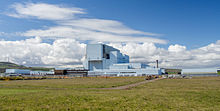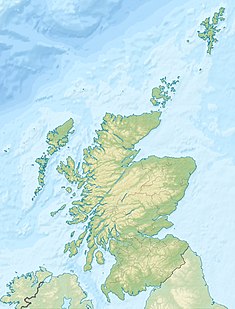Torness nuclear power station
| Torness Nuclear Power Station | |
|---|---|
 |
|
| Country | Scotland |
| Location | Dunbar, East Lothian |
| Coordinates | 55°58′05″N 2°24′33″W / 55.96799°N 2.40908°WCoordinates: 55°58′05″N 2°24′33″W / 55.96799°N 2.40908°W |
| Status | Operational |
| Construction began | 1980 |
| Commission date | 1988 |
| Nuclear power station | |
| Reactor type | AGR |
| Power generation | |
| Units operational | 2 × 682 MWe |
| Nameplate capacity | 1,364 MWe |
Torness nuclear power station was the last of the United Kingdom's second generation nuclear power plants to be commissioned. Construction of this facility began in 1980 for the then South of Scotland Electricity Board (SSEB) and it was commissioned in 1988. Torness nuclear power station is located approximately 30 miles (50 km) east of Edinburgh at Torness Point near Dunbar in East Lothian, Scotland. It is a local landmark, highly visible from the main A1 road and East Coast Main Line railway.
After extensive discussions with the local planning authority and more than twenty other interested organisations, the SSEB sought approval of the Secretary of State for Scotland in 1973 for Torness as a site for a nuclear power station. A public exhibition was held at Dunbar in February 1974 to explain the Board’s proposals, and in June 1974, a public inquiry was held.
There was widespread public opposition to the building of a nuclear plant at Torness. Diverse campaigning groups came together to highlight the environmental and human cost of nuclear power stations. In May 1978 4000 people marched from Dunbar to occupy the Torness site. Many of them signed a declaration to “take all nonviolent steps necessary to prevent the construction of a nuclear power station at Torness”.
The SSEB submitted designs for four types of reactor then being considered by HM Government for the next stage of the UK civil nuclear programme: the advanced gas-cooled reactor (AGR), the Steam Generating Heavy Water Reactor (SGHWR), the Light Water Reactor (LWR) and the High Temperature Reactor (HTR). In February 1975, the Secretary of State for Scotland granted the SSEB statutory consent for the location of future nuclear power stations and, after review of the four alternative reactor types, consent was given on 24 May 1978 for construction of the AGR station.
...
Wikipedia

